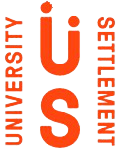This post was originally sent as an email to our supporters. Sign up to receive our emails here.
Highlights
► University Settlement programs train 30+ social work grad students in their field placements every year.
► All members of the cohort participate in an introductory orientation and then meet monthly for professional development.
► Investing in our social work interns and forging connections between them sets our students up for professional success while building our hiring pipeline.
Over the last several years Cate Graney (Director, Home Based Crisis Intervention and Graduate Student Programs) has rebuilt our internship program to ensure that the more than 30 social work grad students who embed within our many disparate programs every year have the opportunity to build relationships with one another while receiving coherent and consistent training.
March is Social Worker Month – a good time to check in with Cate about the impact this approach is having on our interns’ professional development:
Social work is so emotionally and intellectually demanding – we’re always trying to find better ways to be supportive of one another. Grouping all of our interns into a cohort creates community, helping prevent burnout. It also gives us the benefit of being sure that the people who go through this program have similar experiences, and have engaged with a range of common critical perspectives.
Students’ experiences at school and their experiences in their field placement are often very separated, and the connections between what they’re learning in class and what they’re doing in the field can get lost. Our interns get two days of orientation at the beginning of the year, and then we meet once a month for continuing professional development. We also send all our students weekly critical thinking questions to consider, like ‘how have systems of oppression shown up in your work?’ or ‘What skills need to be used in every client interaction?’ This additional layer of programming helps us underline those connections between theory and practice.
Training nearly three dozen future social workers every year is an opportunity for us to make a lasting influence on our field. It’s also a chance to illustrate how the settlement house model is still vitally relevant for social work, and how our constant efforts to integrate our program offerings pay off agency-wide. That’s why we’ve been so intentional about setting up this curriculum – both because we hope to set our students up for success, and because we believe that grounding young social workers in 21st century settlement house values and approaches will serve the field as a whole.
It’s our intention that anyone who comes out of our field training program will be prepared to be hired into a full-time position in any of our programs across our agency. There’s a hiring crisis for social work positions, and creating an employment pipeline was really important to us. We’re hoping to hire as many as possible.
Tracy D., an NYU grad student, has been interning with our marketing and communications team:
“It’s been a valuable opportunity to learn and develop skills that will be directly applicable to my future career as a social worker, including communication skills that will be useful not only when I’m working with participants, but also when I’m interacting with colleagues and other professionals in the field. I’ve also developed useful connections, providing me with a network of supportive peers and potential collaborators. And I’ve gained a better understanding of the current thinking around systems-change or ‘macro’ social work, which I’ll hope to use in the future as an advocate for social justice.”

